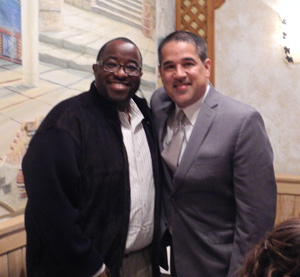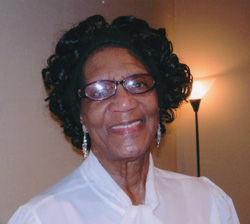

|
|
Empty Nest Magazine
|
GENERATIONS
Fostering with an Empty Nest by Lejla Jusic and April Redzic
Looking for a way to give back once your children have left your home? Consider becoming a foster parent. Maurice Dorris, Licensing Coordinator for ChildServ, a social services agency in Chicago, says that more and more of its foster parents—approximately 30 percent, or about 54 households—are empty nesters. According to Mr. Dorris, empty nesters make great foster parents because they already have experience raising children. “They’ve done it before. They know what it takes, and they want to show the children that they are loved and cared for, ” he explains.
What Is Foster Care?

Maurice Dorris (left), ChildServ Licensing Supervisor, with Chicago comedian Mike Oquendo, at the 2012 ChildServ Foster Parent Appreciation Dinner.
ChildServ is one organization of many that supplies children with supportive and kind foster parents. According to the National Foster Parent Association, foster care is “one of the most challenging steps you will take in your life, and one of the most rewarding opportunities you will ever volunteer for.”
Reasons to Become a Foster Parent Jeanne Wright, now 85, fostered children in Chicago from 1985 until her “retirement” from fostering this winter. She chose to become be a foster parent for 28 years because she wanted to help children in need of a home. “I wouldn’t say I have wisdom,” she said of her success as a foster parent. “But I believe in talking to everyone. Everyone has a story.” Ms. Wright emphasizes the rewards of fostering and the unique and gratifying relationships that it gives both the parent and the child. “My first placement in 1985 was an 8-year-old girl who was deaf,” she recalls. “She decided she was going to teach me sign language. She taught me that people see things differently.”

Foster Parent Jeanne Wright, who nurtured children in her home through fostering from 1985 to 2013. Not only does Ms. Wright open her home to children in need of a home, she stays in touch and maintains friendships with many of them. “They were the ones who taught me about life,” she said. “They taught me how to treat them and taught me how to love them.”
Making the Decision Regardless of their parenting experience, however, Mr. Dorris emphasizes that ChildServ—like other agencies around the country—provide empty nesters with opportunities to be in training programs that teach them how to deal with all situations. Because children come into the child welfare system as a result of abuse or neglect, most children in foster care have experienced some kind of trauma. Agencies make sure that foster parents are prepared for the child’s needs and have the resources necessary for a good fostering experience. Once someone becomes a foster parent, there are many emotional rewards, ranging from seeing the children grow into independent individuals to having fun doing things with them. “The families love to take the children to Disney World, cruises, plays, movies, cultural activities, and birthday parties,” Mr. Dorris says. One of the biggest rewards for foster parents, however, is that they are making a difference to children in need, and they are helping them grow into independent successful individuals.
Becoming Licensed
• Be age 21 or older The National Foster Parent Association outlines the steps to start the process:
1. Contact an agency. According to the National Foster Parent Association, “Foster care is a chance to make the world a better place—one child at a time.” This is your chance! To learn more about the fostering experience, visit the National Foster Parent Association at http://nfpaonline.org/contact. To learn about fostering nationwide, visit The National Foster Care & Adoption Directory, https://www.childwelfare.gov/nfcad/.
 April Redzic is Director of Marketing and Communications at ChildServ. She was President and CEO of her own consulting firm, Words Can Change the World; she has also worked for United Way of Metropolitan Chicago, as well as for Catholic Charities. April is an active volunteer leader in the nonprofit community, and she is co-founder of the St. Sylvester Family Shelter Read-to-Me children's literacy program. She lives in Park Ridge, Ill., with her husband and two sons. To learn more about fostering with ChildServ in Chicagoland, visit www.childserv.org/foster , call 773-867-7323, or email info@childserv.org. April Redzic is Director of Marketing and Communications at ChildServ. She was President and CEO of her own consulting firm, Words Can Change the World; she has also worked for United Way of Metropolitan Chicago, as well as for Catholic Charities. April is an active volunteer leader in the nonprofit community, and she is co-founder of the St. Sylvester Family Shelter Read-to-Me children's literacy program. She lives in Park Ridge, Ill., with her husband and two sons. To learn more about fostering with ChildServ in Chicagoland, visit www.childserv.org/foster , call 773-867-7323, or email info@childserv.org.
Lejla Jusic is a senior at the University of Illinois at Chicago, where she is a Communications major, with a minor in criminology. She is currently a marketing intern at ChildServ. Lejla loves an active lifestyle, and her favorite sport is volleyball. Ellen Feinstein is Associate Editor of Empty Nest. Read more about Ellen in About Us..
|
Empty Nest: A Magazine for Mature Families
© 2014 Spring Mount Communications